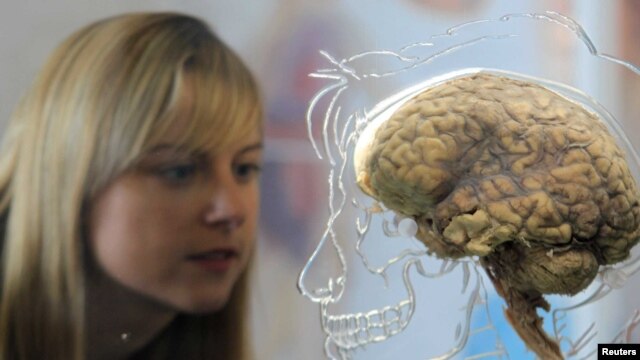美語壇[視頻聽力]欄目: http://bbs.wenxuecity.com/yingyutingli/
******************************************************************************
The teenage brain can be a confusing, complex and misunderstood place. But a brain scientist and mother to two teenagers clears up some of the mystery. (PHOTO Alberto Pomares G. (iStockPhoto)
Understanding the Misunderstood Teenage Brain (ZT)
http://learningenglish.voanews.com/content/understandung-the-misunderstood-teenage-brain/2655326.html
http://av.voanews.com/clips/VLE/2015/02/23/365dc502-9563-4c4d-a54e-78ad57a5d25c_original.mp3?download=1
A woman named Frances Jensen is a neuroscientist. She has been studying the human brain for almost all of her career. But even she was not ready for the job of raising two teenage boys. What made this task so difficult? Trying to find out why intelligent and responsible young people still did stupid things.
So, Doctor Jenson did what any neuroscientist would do: she studied years of research on the human brain.
What she found might clear up some myths, or misinformation about teenagers. Her findings might also provide help for parents, teachers … and anyone hoping to understand the complex mind of a teenager.
Myth 1 – A teen’s body and brain grow at the same pace
When children reach puberty, their bodies change. Teenagers start to look like adults. You might think that their brains are also becoming more like adult brains.
Not true, says Dr. Jensen.
“The brain is the last organ in the body to mature. And it takes into the mid-20s for it to complete.”
Dr. Jensen says if one compares the brain to a puzzle, the teenage brain has many puzzle pieces still not in place. She says the teen brain has a different structure and chemistry from an adult brain.
"The teenage brain is indeed different in terms of its chemistry and structure. It's about 80 percent -- I say that loosely -- of the way the adult structure and function."
Dr. Jensen recently wrote a book on teenagers and their brains. The book is called The Teenage Brain: A Neuroscientist’s Survival Guide to Raising Adolescents and Young Adults. In it, she explains the strengths and weaknesses of the brain during this time of development. She says the connections, or wiring, of the teen brain is better for learning new things than the adult brain.
First, Dr. Jensen explains how the brain works. She says we are able to learn through synapses -- areas where brain cells talk to each other. The chemicals responsible for synapses are found in high levels in children. Then they drop a little in teenagers and drop even lower in adults. Dr. Jensen explains that this is why children learn things like languages so easily.
“The proteins and the chemicals involved in building synapses for learning are at higher levels, very, very high levels in the child, and a little bit less in the adolescent and then come down to sort of adult levels, which is why a child can learn two, three languages flawlessly and a teenager is pretty good, not quite as good as a child, but better than an adult in terms of the rate at which they can learn and absorb information.”
So, the teenage brain has an increased ability to learn but it does not yet have all the connections to make that learning possible. This is one reason why teenager behavior is often difficult to understand.
Dr. Jensen compares this situation to a driver who is able to drive but who does not know yet how to use brakes to stop the car.
Some parts of the teenage brain are simply not yet connected, she explains. These areas are the ones responsible for judgment, making good decisions, self-control and empathy, or the ability to share someone else's feelings.
Myth 2 - The teenage brain is resilient
Another myth Dr. Jensen put to test is how teenagers are able to recover from a bad experience – what we call being resilient. At times, she says, the teenage brain is resilient. But in other ways it is not. Things like stress and drug and alcohol use can give teens long-term problems.
"And we always thought, 'Oh they are so resilient.' Well, they are and they aren’t. You know, there are certain things that can affect them life-long. The same amount of experiences like stress or alcohol or pot, an adult may sail through it - for the same exposure - but a teenager will bear a long-term problem based on that.”
Dr. Jensen says drugs and alcoholic drinks can have much more serious effects on the teen brain than on an adult brain. She says drugs and alcohol can especially affect a teenager’s Intelligence Quotient, or IQ.
“Your IQ can change up or down between 13 and 17 (years old). We don’t yet quite know what specifically can make an IQ go up or down, but one thing that we know does make IQs go down is certainly exposure to certain drugs, for instance chronic pot smoking; the more you smoke the lower your IQ is going to go during that time window."
Myth 3 – Teenagers are lazy
Many studies have shown that sleep is important for learning and memory. But many teens - both boys and girls - often don't get enough sleep. When teenagers stay up late at night and wake up late in the morning, parents may think it is because they are lazy.
This lack of action, Dr. Jensen explains, is another myth about teenagers. She says a teen’s biological clock is set differently than an adult’s. A biological clock controls the body’s waking and sleeping processes.
She explains that the brain releases a hormone to make you sleepy. An adult releases that sleep-causing hormone around 8:30 at night. But a teenager’s brain does not release that chemical until about 11 at night. This leads to a later bedtime, even when the teen has to wake up early the next morning.
“This is another myth. Their biological clocks are absolutely programed to be 2 to 3 hours later for the sleep start time and wake time than adults. And of course, we wake them up at 6:00 in the morning, which is equivalent to about 3:00 in the morning for an adult. It’s probably not the optimal time for their brains to be put in a learning environment."
Dr. Jensen says all this new information about the teenage brain can help adults do a better job as teachers and parents. She advises adults to stay connected with teenagers and to be more patient with them.
She says parents should share this information with their children. Knowing how their brains work may help them get through their teen years more happily.
I’m Anna Matteo.
歡迎更多的網友直接點擊美語壇左邊的相關欄目發帖:
http://bbs.wenxuecity.com/mysj/


